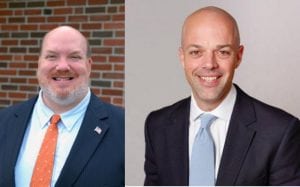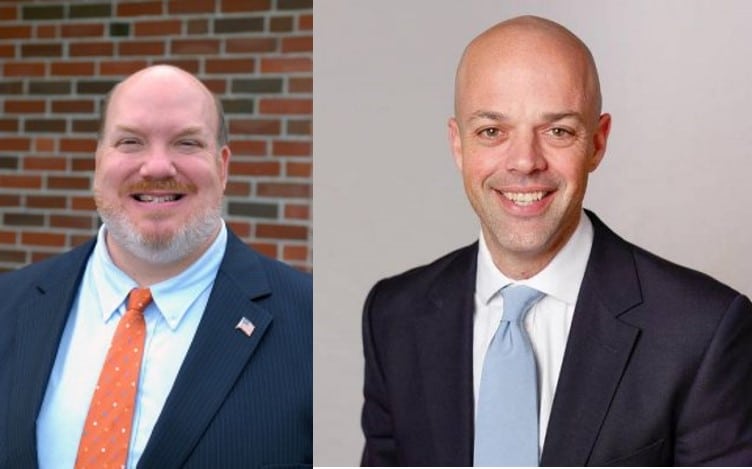
State Senator Donald F. Humason, Jr., 2nd Hampden & Hampshire District (left) and State Senator Adam G. Hinds, Berkshire, Hampshire, Franklin & Hampden District
BOSTON— State Senators Don Humason (R-Westfield) and Adam G. Hinds (D- Pittsfield) each announced on Friday that the Massachusetts Senate unanimously passed H. 4613, An Act promoting climate change adaptation, environmental and natural resource protection and investment in recreational assets and opportunity, often referred to as the “environmental bond bill” by a vote of 38-0 on Thursday. The legislation authorizes the issuance of more than $2 billion in bonds to implement climate change adaptation programs and to improve existing climate resilient infrastructure.
“I am pleased that the Senate unanimously approved this important bond authorization,” said Humason. “This bill will provide essential resources to our local communities as they look to improve storm water management, maintain and improve parks and waterways, and make necessary repairs and enhancements to local bridges and bike paths.”
“The Senate’s environmental bond bill provides necessary resources to preserve the Commonwealth’s natural resources and promote economic growth,” said Hinds.
Humason sponsored amendments including $600,000 for storm water drainage management at Westfield-Barnes Regional Airport; $800,000 for completion of the downtown corridor phase of the Columbia Greenway project in Westfield; $850,000 for construction of a bike path in Southampton; and $500,000 for maintenance and improvements for Hampton Ponds State Park in Westfield.
Hinds pointed to almost $30 million in new capital spending authorizations and reauthorizations of existing spending authorizations to maintain key environmental infrastructure, protect natural resources and promote outdoor recreation in the Berkshires and western Massachusetts, including $10M for a Lakes & Ponds Grant Program to assist lake associations statewide with technical assistance, studies, preservation, and environmental improvements, including the removal of aquatic invasive plants; $800K to identify, map, market, develop, and construct western Mass mountain biking trails in Berkshire, Hampshire, Franklin & Hampden Counties, and $500K for design and construction of infrastructure to link existing sections of the Highlands Footpath route, which extends throughout southern Berkshire County into the Pioneer Valley, from Lee to Goshen.
Hinds announced that he also co-sponsored a number of policy amendments which were adopted by the Senate during Thursday’s debate to protect Article 97 land, promote agriculture and reduce pollution, including: Public Lands Preservation Act – “No Net Loss” of Article 97 Land – this amendment clarifies and standardizes the process by which state and local governments can remove the protected status of public lands in order for them to be used for other purposes. It ensures “no net loss” of protected lands in the Commonwealth.
Other policy amendments sponsored by Hinds included Raw Milk Delivery, which directs the state Departments of Agricultural Resources (MDAR) and Public Health (DPH) to adopt regulations regarding the delivery of raw milk and authorizes licensed raw milk farmers to deliver raw milk directly to the consumer with a direct contractual relationship or through a Community Supported Agriculture (CSA) delivery system; and Plastic Bag Reduction, which creates a uniform standard for single use bags by banning plastic bags across the state and represents a compromise from years of work and negotiations with stakeholders in the public and private sectors.
The House of Representatives previously passed an environmental bond bill on June 13th, under the leadership of Berkshire State Representative William “Smitty” Pignatelli (D- Lenox), who serves as the House Chairman of the Joint Committee on the Environment, Natural Resources & Agriculture. It is expected that a conference committee will be appointed by House and Senate Leadership to negotiate differences between the two bills and develop a final environmental bond to be forwarded to the Governor.








